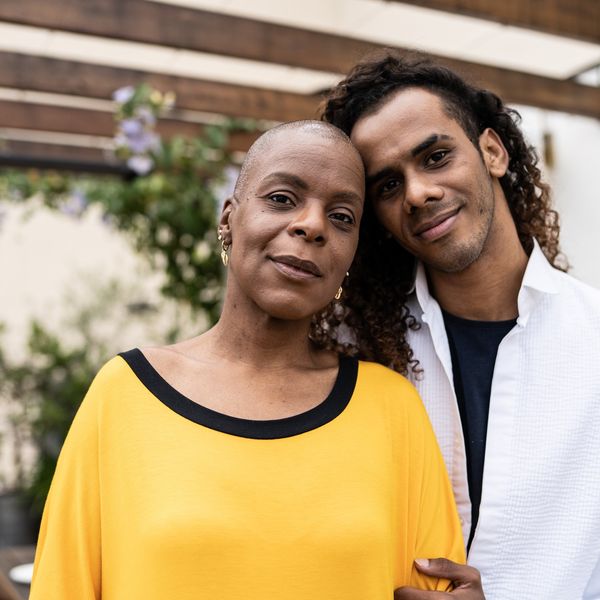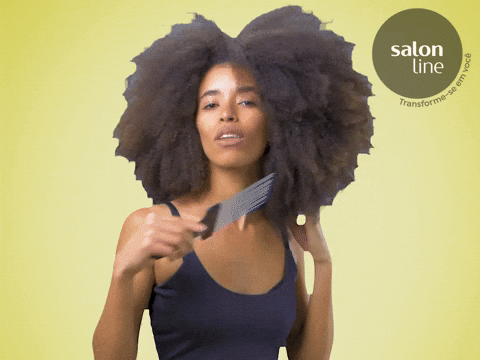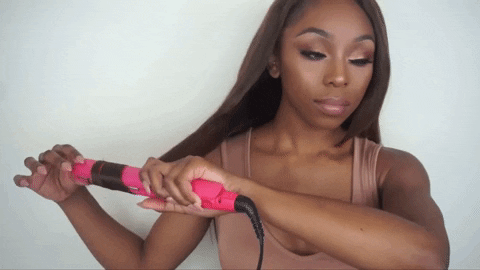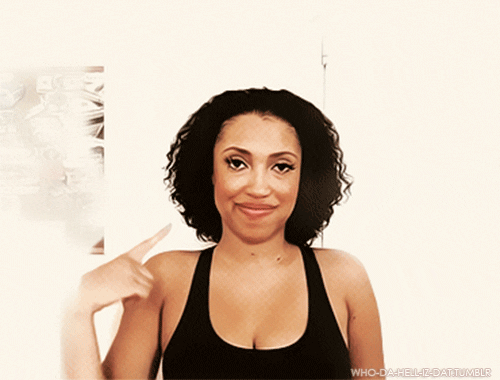
If there's one thing that I think all of us can agree on, it's the fact that dating is a bit of an enigma. The rules are always changing. The expectations are all over the place. Hell, some of us haven't been impressed while being on a date in so long that we wonder if the art of dating even exists anymore.
If I was able to figure all of this out, I'd be a millionaire—a few times over—by now. But I did do a little research on things related to dating in the hopes that it might help you to connect a few dots or at least get a little clarity on a couple of matters. So, if you've been wondering why guys keep wanting to meet up at Starbucks, why you are turned on by vegans or how long you should date someone before wanting to meet his mama or give him some, below are some answers I found that are based on various studies and dating experts. Check it out, forward it to your significant other, and also jump into the comments to share your views. With a little bit of input from us all, maybe—just maybe—we can figure out this whole dating thing together.
1. Where are the most popular dating spots?

As far as actual dates go, I'm the kind of gal who will give a guy major points for creativity. I guess that's why I found it pretty interesting—and disappointing—when I read an article on Ask Men's site that shared some of the most popular dating spots of last year. Some that cracked the Top 10 include—Starbucks (#1), Chick-fil-A (#2), Panera Bread (#5), Barnes & Noble (#7) and…y'all already know—Cheesecake Factory (#10). Le sigh. Am I the only one who isn't impressed?
I think this is why I am a huge fan of a couple of phone conversations leading up to a first date. That way, you both can get a feel for each other's personality, interest and overall vibe—and that can keep you out of Olive Garden (which also made the list). No diss to it, it's just…I am a firm believer that a man who puts forethought and creativity into first dates and marriage proposals is a man who is showing real sensitivity and fascination as it relates to the object of his affection.
Hmph. I must not be the only person who think this way because, according to The Art of Manliness site, their idea of great first dates are picnics, amusement parks, paint and sips—places that are fun and also places that are a little outside of the typical dinner and a movie idea.
Oh, and as far as signs that a first date didn't go so well, dating experts believe that if the conversation was dull, your date was distracted, no talk of a future date comes up on the date or a full day goes by without any sort of follow up at all…well, even if there are some great explanations as to why these things happened, you're still seeing, fairly early on, if you're going to be doing a significant amount of maintenance in order to keep things going. Just something to think about.
2. What subconsciously makes someone feel connected on a first date?
I can tell I'm getting older because my face frowned a bit when I kept reading that it was poor etiquette to ask someone what their last name is when you're first making a connection with them. What in the world? Even my homie-lover-friends, I know their middle name, birth date and where they were born—and I knew all of this before they got some. But apparently these days, last names are privileged information. Something else that I read is if you're on a first date and you really want to make the person feel special, you should say their first name a few times. It indicates that you are interested in them, that you care enough to retain their name, and that you want to be comfortable enough to remain on a first name basis with them in the future.
3. How long do individuals prefer to wait before having sex for the first time?
Chrissy Teigen has been pretty open about the fact that she slept with 2019's Sexiest Man Alive on their first date. Now they're married with two children, so the taboo belief that having sex on the first date automatically dooms the possibility of establishing a solid relationship isn't one that holds a ton of weight (clearly, when there are articles out in cyberspace like "Why More People Are Having Sex on the First Date"). Still, that doesn't mean that sex on the first date is the rule; for most, it's still more like the exception. So, just how long do most people think that you should wait before getting it on for the first time? A Groupon study of 2,000 individuals came to the conclusion that it should happen after around eight dates; although most men were "cool" with waiting until the fifth date and most women preferred to wait until the ninth.
4. How often should you see your significant other to keep the relationship healthy?
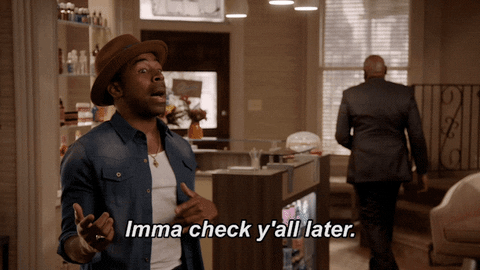
This particular point I found to be interesting, mostly because it has something in common with how often married folks have sex in order to keep their relationship in a thriving state. If a married couple wants to feel happy and connected, they need to copulate the same amount of times a week that a new couple needs to see one another in order to get similar results. And how often is that? Once a week. Anything more than that can cause fires to burn out quickly. It can also prevent you from "pacing your way" into the relationship so that you can figure out if it's something that you want as opposed to merely being something that you feel (some of y'all will catch that later).
5. What is an underrated key to relational happiness?
While on the surface, this one seems a little odd, if you really stop to think about it, it makes sense. One study that featured 1,000 men and women discovered that whenever an individual is dating someone who is a conscious and healthy eater, they are happier in the relationship—even if their own eating lifestyle totally sucks.
I'd venture to say that, even if it's a subconscious thing, people probably admire someone who is intentional about caring for their temple. Not only that, but if that person is interested in caring for themselves, it could be a good indicator that they will take care of the person they are seeing too.
6. How many dates, on average, lead to exclusivity?
If you've been on about 3-4 dates with someone, you really like him, and you're wondering if it's time to have "the talk", what a lot of dating experts believe is you should wait until you've gone on eight dates before bringing up the topic of exclusivity. If you go on a date with someone once a week, that averages out to being a couple of months, so that sounds about right. Whatever you do, just make sure that you conduct a little "pre-commitment interview" first. A whole lot of us have found ourselves falling for the wrong men or totally wasting our time, oftentimes because we assumed that they wanted what they did when…they didn't.
(Sidenote: Did you peep that exclusivity and sex both require eight dates? Interesting.)
7. What is the “expiration date” on most new relationships?

Cuffing season can really be a trip; especially when you factor in that the most popular times for couples to break-up is either right before Christmas (I'm willing to bet that is men) or right after Valentine's Day (wouldn't be surprised in the least if that was women). Some folks don't want the pressure of taking things to the next level during the holiday season while others put a lot of stock into Valentine's Day, only to get disappointed and determine that they deserve better.
Now, as far as how long new relationships typically last, in general? According to several Google links that I checked out, the average is somewhere between 3-5 months. Why is that? Five months usually gives us enough time to know if we're motivated by nothing more than lust, if the person is doing things that are deal-breakers for us and/or if we're simply too impatient—or disinterested—to put the work in to make the relationship last. If you're seeing someone new, how long has it been? Have y'all made it over the five-month-hump yet?
8. What things turn men off about women they’re seeing?
A website that I used to write for back in the day is The Good Men Project. In an article published on the site entitled "5 Secret Male Turn-offs Women's Magazines Won't Tell You", what I appreciated is it didn't ask women what turned men off; they asked men. What the men shared where things like belittling a man's sexual needs, comparing him to other men or trying to guilt trip him for wanting to do things outside of spending time with you. To me, that sounds pretty realistic. In fact, I'd think that the only women who "feel some type of way" about those things are women who are doing those types of things. And, in the wise words of Dr. Phil, "How is that workin' for ya?" As far as a list of what turns men on, check out "I Asked 10 Men What Turned Them On. This Is What They Said." for a little insight.
9. Does astrology actually play a role in compatibility?
Some of y'all are gonna fight to the death on this one. But apparently, the online dating site OkCupid conducted a study that included 500,000 people to see if there is any truth to astrology and compatibility. You can click here to read the entire break down, but the bottom line is no, there isn't. So, if you're a Gemini like I am, you're currently digging a Scorpio but you're hesitant because you read somewhere that they're not a good fit, I'd still go on a couple of dates if I were you.
Putting too much emotional weight on astrology can create self-fulfilling prophecies; you can determine someone isn't good for you due to some chart when, in all actuality, they just might be your perfect match. Not because of when their birthday falls but because of who they are as individuals.
10. When should you introduce someone to your parents and friends?
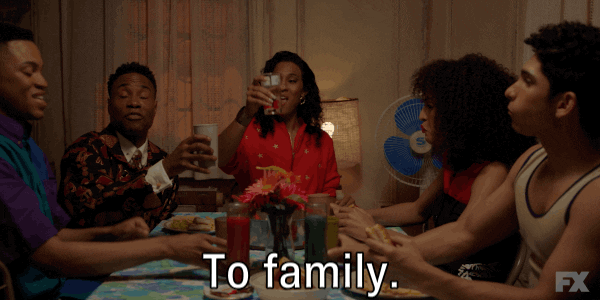
They say that if you've been in a relationship with someone for a while and you haven't met any of their family members or friends, that could be a red flag; maybe they are involved with someone else, they don't take the relationship as seriously as you do or, it's an indication that they've got layer of things to hide, with their loved ones only being a layer of that. If you've been seeing someone enough to go through all four seasons of the year once, I would be inclined to agree. At that point, you should've at least spoken with someone who is a part of their world.
But if you feel like your significant other is on the up-and-up but since it's only been a few months you're still not sure when the right time to meet their loved ones are, here's the deal. A lot of millennials tend to think it's cool after about 10 dates or so. At the same time, a lot of dating experts think that is way too early; they believe that you need to take at least five months to see if the relationship is serious. Then, after that time, introduce the person you're seeing to some friends; then family. Oh, and when it is time to see the fam, avoid family functions at all costs. Those types of events will only put more pressure on you. Plus, it sends the message that you know exactly where the relationship is headed when, after only a few months, you probably don't.
11. Who has a harder time healing from a break-up? Men or Women?
This is something that I am glad is getting more attention because, while it might be assumed that men aren't as affected by heartbreak as women are, what's actually going on is we tend to grieve and heal earlier and faster than they do. In fact, there's a study that supports the fact that since women invest more emotionally into their relationships, they are more emotionally self-aware in how to handle a break-up. Meanwhile, many guys don't spend as much time processing emotions. As a result, when a relationship (that truly matters to them) ends, they see it as an irrevocable loss than can take years for them to get over—if they ever do. (I know at least 10 guys personally who can personally attest to this; they still talk about their first love like the break-up happened last year.)
12. Who actually says, “I love you” first? Men or Women?
Talk about debunking a myth. I'm willing to bet that at least half of y'all read this question and immediately said, "Duh. Women." However, that isn't the case. According to several published studies, it is the fellas who experience feelings of love, as early as a few weeks into a new relationship. Now, that doesn't mean that all of them have the best of intentions when it comes to saying "I love you" because, there are also reports that indicate some do it in order to win our trust so that they can "get the meats". Still, that isn't the case for everyone, so if you're seeing a guy and he says, "I love you", if his words and actions complement one another, chalk it up to him being honest and society underrating a man's true sentimentality—at least until or unless he proves otherwise.
Welp. There you have it. Dating, in a nutshell—kinda, sorta. Whatcha think? Did it make things clearer or more confusing than ever? Sound off in the comments. Let us know.
Want more stories like this? Sign up for our newsletter here and check out the related reads below:
Should You Consider Dating Someone You're Not Attracted To?
Experts Say You Should Date This Long Before Getting Married
5 Things That Are OK To Require On A First Date
Three Dates In. Should The Two Of You Move Forward? Or Not?
Feature image by Shutterstock
Did you know that xoNecole has a podcast? Subscribe on Apple Podcasts or Spotify to join us for weekly convos over cocktails (without the early morning hangover.)
- 16 Facts About Dating That Will Change The Way You Think About ... ›
- 11 Facts About Domestic And Dating Violence | DoSomething.org ›
- 10 Fascinating Facts About the Evolution of Dating and Courtship ... ›
- 20 Random Facts About Dating, Sex, Breakups and Divorce ... ›
- 5 facts about online dating | Pew Research Center ›
- 76 Interesting Facts about Dating | FactRetriever.com ›
This Is How To Keep 'Holiday Season Stress' From Infecting Your Relationship
Hmph. Maybe it’s just me, but it seems like there is something really weird happening in the fall season air (because winter doesn’t officially begin until December 21) that cuddle season is in full swing while break-up season is as well. In fact, did you know that break-ups are so popular during the holiday season that December 11 is deemed Break-Up Day?
The reasons why relationships shift around this time vary; however, I did both roll my eyes and chuckle when I read that a very popular one is because it’s an easy way to get out of getting one’s significant other a Christmas present. SMDH.
Anyway, I personally think that the less shallow folks out here may contemplate calling things “quits” or they at least distance themselves a bit from their partner (and what I’m referring to is serious relationships) due to all of the stress and strain that oftentimes comes with the holidays whether it be financial, familial, due to their tight schedules or something else.
Listen, I would hate for you and your man to miss the fun and happiness of experiencing this time of year, all because you are so overwhelmed or irritated that you can’t really enjoy it. That’s why I have a few practical tips for how to avoid allowing the typical holiday season stress from INFECTING your relationship.
Manage Your Expectations
 Giphy
GiphyUnmanaged expectations. If there is a main reason why the holiday season tends to be so stress-filled for so many people, I’d bet good money that this is the cause. And when you’re in a long-term relationship, expectations can manifest themselves in all sorts of cryptic and/or unexpected ways. You might have relatives who assume that you are going to be with them for Thanksgiving or Christmas when you have other plans in mind. You might be thinking that you are going to spend one amount for presents while your man is thinking something totally different. When it comes to scheduling, your signals may be crossed.
And you know what? To all of these scenarios, this is where clear and consistent communication come in. Don’t assume anything. Don’t dictate anything either. From now until New Year’s, mutually decide to check in once a week, just to make sure that you are both on the same page as it relates to the holidays and what you both are thinking will come along with it. The less blindsided you both feel, the less stressed out you will be. Trust me on this.
Set (and Keep) a Budget
 Giphy
GiphyOkay, so I read that last year, 36 percent of Americans incurred some type of holiday-related debt. Hmph. Last year, there was still some sense of normalcy in this country, chile, so I can only imagine what finances are gonna look like over the next several weeks. That said, since I don’t know a lot of people who don’t find being broke stressful, make sure that you and your bae set a budget and then stick to it this year — no ifs, ands or buts.
Because really, y’all — it doesn’t make sense to deplete savings and/or max out credit cards for a few days of giggles only to be damn near losing your mind because you don’t know how to make ends meet come Dr. Martin Luther King, Jr. Day.
And by the way, this tip doesn’t just speak to things like food and gifts; I also mean travel. If it doesn’t make a ton of sense (or cents) to be all over the place this year — DON’T BE.
Keep Matthew 5:37 at the Forefront
 Giphy
GiphyIf off the top of your head, you don’t know what Matthew 5:37 says, no worries, here ya go: “But let your ‘Yes’ be ‘Yes,’ and your ‘No,’ ‘No.’ For whatever is more than these is from the evil one.” That verse right there? Oh, it’s a boundaries lifesaver! I say that because do you see “maybe” or “I’ll think about it” in there? Nope. LOL. It says that you should tell people “yes” or “no” and leave it at that — and that complements Anne Lamott’s quote, “’No’ is a complete sentence” impeccably well. Yeah, you’ve got to remember that anything beyond a yes or no to a request is privileged information; you don’t owe anyone details or an explanation.
Besides, if you are really honest with yourself, when someone asks you something and you give a “Umm, let me think about it” kind of reply, more times than not, you already know what your answer is going to be — so why not let you both off of the hook? Give your response. Commit to that. And let everyone (including yourself) get on with their lives and schedules.
I promise you that when it comes to those holiday parties, you are pissing more folks off by not RSVP’ing or doing so and not showing up than just saying, “Thank you but not this year” off the rip.
Remember That Your Personal Space Is Privilege Not a Right
 Giphy
GiphyA friend of mine recently bought a new house and invited me over to come see it. He’s a single man with no children, so as I was taking in all of the space that he had, especially as I walked through his finished basement, I joked about relatives coming to live with him. “Hell no” and “absolutely not” were pretty much his immediate responses as he went on to say that some folks even had the nerve to be offended when he told them that he had no intentions on taking DNA in.
Ain’t it wild how people think that your stuff is their right? And yes, that brings me to my next point. Your home is your sanctuary space. If you want to host folks this year — cool. If not, ALSO COOL. Please don’t let folks (family included) guilt you into how they want you to act or even into what they would do if the shoe was on the other foot. You are not them — and as one of my favorite quotes states, “If two people were exactly alike, one of them would be unnecessary.” (A man by the name Larry Dixon said that.)
Hell, my friends? They know that I am good for sending them random things that they need or even want all throughout the year. Coming over to hang out at my pace, though. Uh-uh. Chalk it up to being a card-carrying member of the ambivert club yet I like keeping my living space personal — and I sleep like a baby, each and every night, for feeling that way.
Always remember that your space, your time, your resources, your energy and shoot, yourself period (including your relationship), are all things that are your own. You get to choose how, when and why you want to share them. The holiday season is certainly no exception.
Cultivate Some “You Two Only” Traditions
 Giphy
GiphyIt’s not uncommon for some couples to hit me up after the holiday season to “detox.” Sometimes it’s due to the financial drama (and sometimes trauma) that they experienced. Sometimes it’s because they allowed their relatives (especially in-laws) to get more into their personal business than they should’ve. More than anything, though, it tends to be because they didn’t get enough quality time together and so ended up feeling “disconnected.”
Please don’t let that happen. Listen, I’m not even a holidays kind of woman and yet, I will absolutely sit myself down with some hot chocolate and chocolate chip cookies to enjoy a Hallmark holiday film or two. Aside from the fact that most of them are lighthearted and sweet, I also like that they usually focus on couples loving on each other amidst all of the holiday beauty and ambiance — which is something that all couples should set aside some time to do.
Maybe it’s a vacation. Maybe it’s a staycation. Or maybe it’s my personal favorite, A SEXCATION. Whether it’s for a few days, the weekend or even overnight — don’t you let the holidays go by without setting aside time for you and your man to celebrate one another. Don’t you dare (check out “Are You Ready To Have Some Very Merry 'Christmas Sex'?”).
GET. SOME. REST.
 Giphy
GiphyI once read that 8 out of 10 people get stressed out over the holidays and 3 out of 10 lose sleep during to it — and when you’re stress-filled and sleep-deprived, that can absolutely lead to hypersensitivity, making mountains out of molehills and even not being in the mood for sex.
Your relationship can’t afford to go through any of this, so definitely make sure to prioritize rest. I don’t care how unrealistic it might seem during this time, sleep should never be seen as a luxury; it will always and forever be a great necessity.
That said, try to get no less than six hours of shut-eye in (check out “6 Fascinating Ways Sex And Sleep Definitely Go Hand In Hand”) and even ask your bae to take a nap with you sometimes (check out “Wanna Have Some Next-Level Sex? Take A Nap, Sis.”). Not only will sleep help to restore your mind, body and spirit but, when it’s with your partner, it’s an act of intimacy that can make you both feel super connected, even in the midst of what might feel like chaos.
___
Holiday season stress is real. Still, never give it the permission or power to throw your relationship off. Put you and your man first and let the holidays be what they are gonna be, chile.
Let’s make things inbox official! Sign up for the xoNecole newsletter for love, wellness, career, and exclusive content delivered straight to your inbox.
Featured image by Shutterstock
It’s probably been over the past 2-3 years that I’ve become hyper-focused when it comes to applying certain chemical exfoliants known as acids to my skin. Personally, I’ve come to really appreciate ones like mandelic acid and hyaluronic acid because they have a way of softening my skin, brightening it up and really evening out my complexion overall.
In fact, on my skin, they have been so effective that they have caused me to wonder what would happen if I applied some of them to my hair too — and boy, was it an experiment that paid off big time!
If, while on your continual journey to get the best out of your own tresses, you’d like to learn how to get them healthier than it’s ever been, I’ve got seven acids that are typically known for skin use that can be just as beneficial to your hair as well.
1. Salicylic Acid
When it comes to your skin, salicylic acid is beta-hydroxy acid that is great for your skin if you’re looking for something that will exfoliate it, clear out your pores and dissolve dead skin cells. In fact, this is why it’s an acid that is quite popular when it comes to treating acne.
Your hair will enjoy salicylic acid because, if you’re looking to remove product build-up, you want to soothe an itchy or irritated scalp or you’ve got some dandruff flakes that are totally driving you up the wall, salicylic acid has the ability to treat all of this. Either purchasing a shampoo that contains this ingredient or adding it to your favorite scalp scrub is probably the most effective way to get the most out of it.
Just make sure that if your scalp is sensitive or dry that you approach with caution. In these instances, it could end up irritating your scalp more than helping it out, so use a very little bit in the beginning to make sure that it vibes with you.
2. Lactic Acid
Lactic acid is an alpha hydroxy acid that can help to even out your skin tone as well as slow down the signs of aging. The properties in it help to do this by reducing hyperpigmentation and boosting collagen production in your skin as well as keeping it hydrated.
Why is it great for your locks? For one thing, lactic acid is considered to be a humectant. This means that it pulls water from the air so that your hair is able to remain moisturized.
Another thing that makes it a winner is the fact that lactic acid breaks down dead skin cells on your scalp (so that your hair follicles are able to flourish), it can help to soften and detangle your hair (making it a helpful addition on your wash days) and it also helps to protect your tresses from heat styling tools and UV damage. Applying a hair rinse that’s made up of part lactic acid and part water can work wonderfully (so long as you apply it once a month, tops; more than that might be too “intense” for your hair strands).
3. Glycolic Acid
Glycolic acid is a water-soluble alpha hydroxy acid that is actually made from sugar. Your skin will adore it because it smooths the appearance of fine lines and wrinkles, improves the texture of your skin, gently exfoliates, clears your pores and brightens up your complexion overall.
The reasons why you should consider this acid for your hair is because it helps to keep your scalp youthful (and yes, there is such a thing; check out “Your Scalp Ages Six Times Faster Than Your Face. Why It Matters.”), removes excess sebum (that could be clogging up your hair follicles) and it helps to keep your hair moisturized. Your best bet here is to make it a part of your pre-shampooing ritual.
4. Succinic Acid
Succinic acid is an acid that is made from sugar cane and contains antimicrobial and anti-inflammatory properties. Although it doesn’t exactly exfoliate (like many of these other acids do), it can still be beneficial to your skin when it comes to reducing the kind of irritation that is associated with eczema, decreasing the bacteria that leads to breakouts and keeping your skin pretty hydrated.
As far as your hair goes, this is an acid that is worth trying out because it helps to balance the sebum that is on your scalp, remove dead skin and product build-up that can irritate your scalp and clog your hair follicles and, succinic acid is also beneficial when it comes to reducing dandruff and helping to prevent hair loss. Most people tend to apply this as a serum.
5. Hyaluronic Acid
I’ve officially sung the praises of hyaluronic acid on this platform before. One example is via the article, “Why Your Skin, Hair, And Nails Need Hyaluronic Acid Like...Yesterday.” On the skin tip, hyaluronic acid is great because it deeply hydrates your skin, contains anti-aging properties and can even bring relief to vaginal (including vulvar) dryness.
Your hair will adore this particular acid because it aids moisture to it (including your hair follicles), will help to improve your hair’s texture and it also soothes scalp dryness, nurtures the cuticles of your tresses and decreases frizz. Using a serum rich in this acid as a pre-poo or as a leave-in conditioner is recommended.
6. Azelaic Acid
If you’ve never heard of azelaic acid before, this is your lucky day. It’s a dicarboxylic acid that, when it comes to skincare (and hair care) products, is usually synthetic. Anyway, if you are looking for a way to reduce inflammation, even skin tone after a breakout or if you want to use an exfoliant that will improve the texture of your skin overtime, you might want to give this acid a shot.
This one makes the list as far as your hair is concerned because, if achieving more inches is your current focus, azelaic acid might come in handy. That’s because it is able to strengthen your hair, thicken your strands and also stimulate hair growth from within your hair follicles.
7. Glutamic Acid
Glutamic acid is actually a type of amino acid. Skin-wise, it’s great for deeply hydrating your skin as well as protecting it from pollutants and damaging UV rays. Also, if you’re looking for an acid that treats skin dryness or “tightness,” this could be the answer to your prayers.
Since glutamic acid is also considered to be a humectant, it’s another acid that can moisturize your hair. As a result, it can decrease breakage while helping your hair to feel smooth and look shiny.
BONUS: Amino Acids
Speaking of amino acids and hair, please try to keep some amino acids in your diet at all times. The reason why is because, since your hair is made up of mostly protein (keratin, to be exact), amino acids are pretty darn effective when it comes to helping you to maintain the overall health and well-being of your hair.
Ones to prioritize include proline (it boosts collagen so that your hair strands can maintain flexibility); arginine (it increases blood flow to your hair follicles so that they can receive the nutrients that they need); cysteine (it helps to keep your hair follicles healthy); alanine (it helps your system to produce more collagen), and isoleucine (it strengthens the tissues that help to make up your hair strands). All of these are available in supplement form or you can use Google to see which foods contain them.
___
Although it might initially seem odd to apply acid to your hair, as you can see, certain ones will work miracles for it. So, test them out to see which one tickles your fancy.
Hell, since they work for your skin as well — it’s a two-for-one deal that is worth every penny!
Let’s make things inbox official! Sign up for the xoNecole newsletter for love, wellness, career, and exclusive content delivered straight to your inbox.
Featured image by Shutterstock







